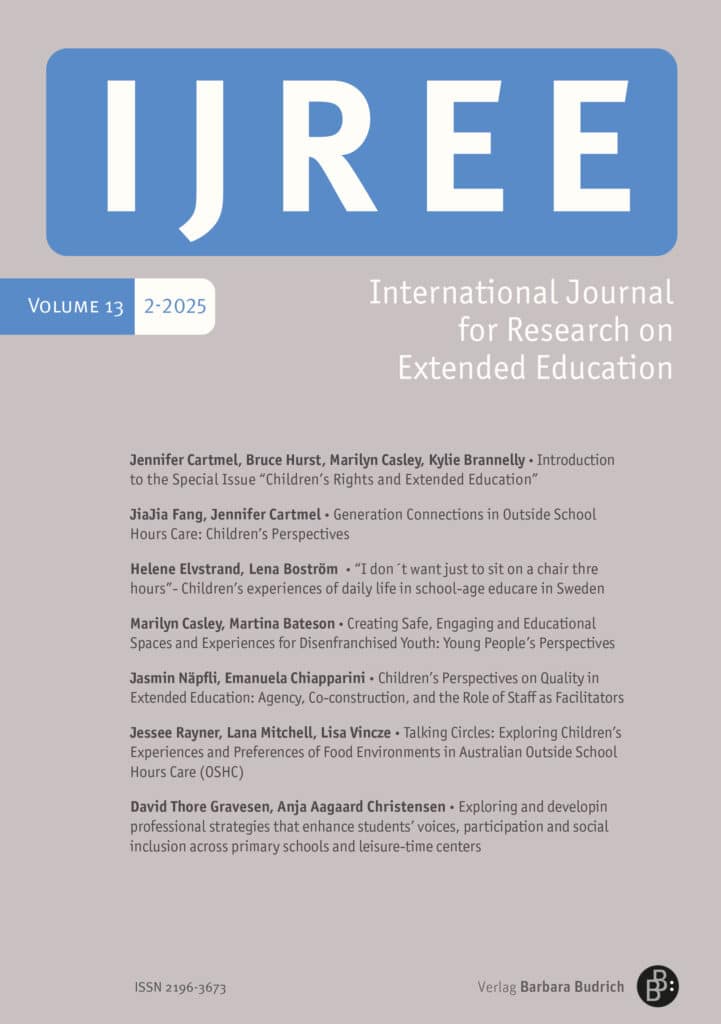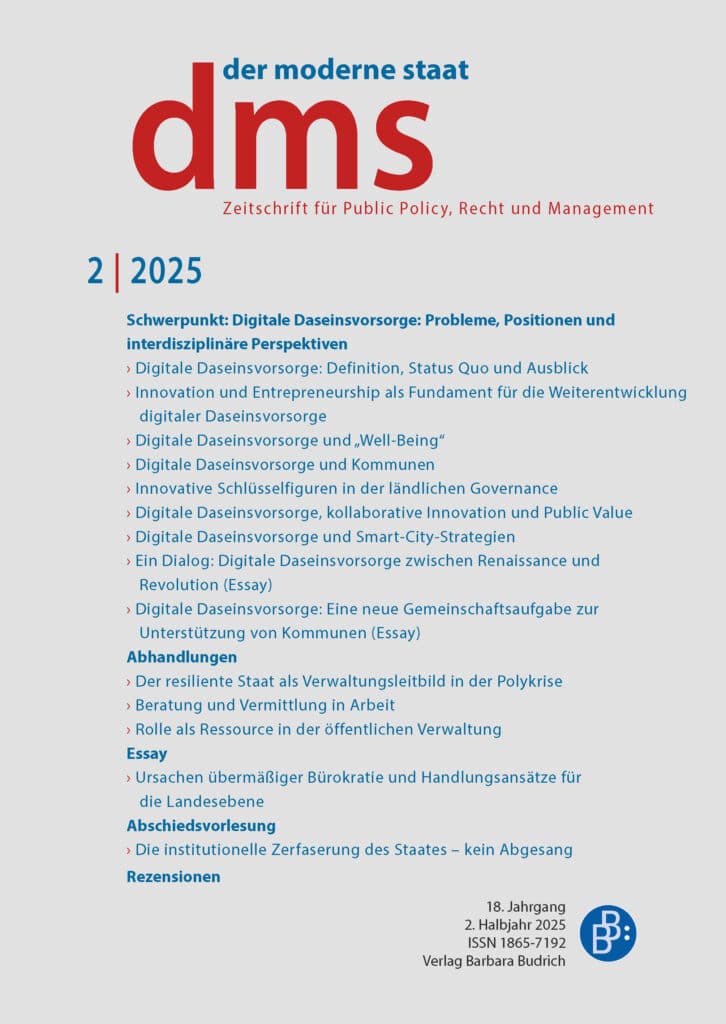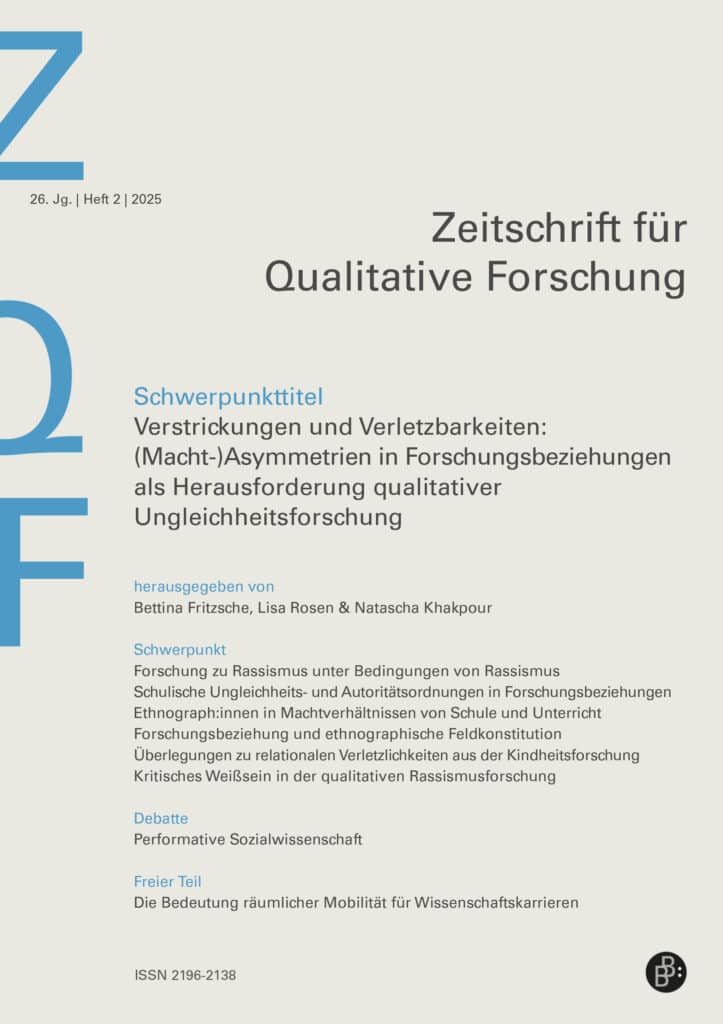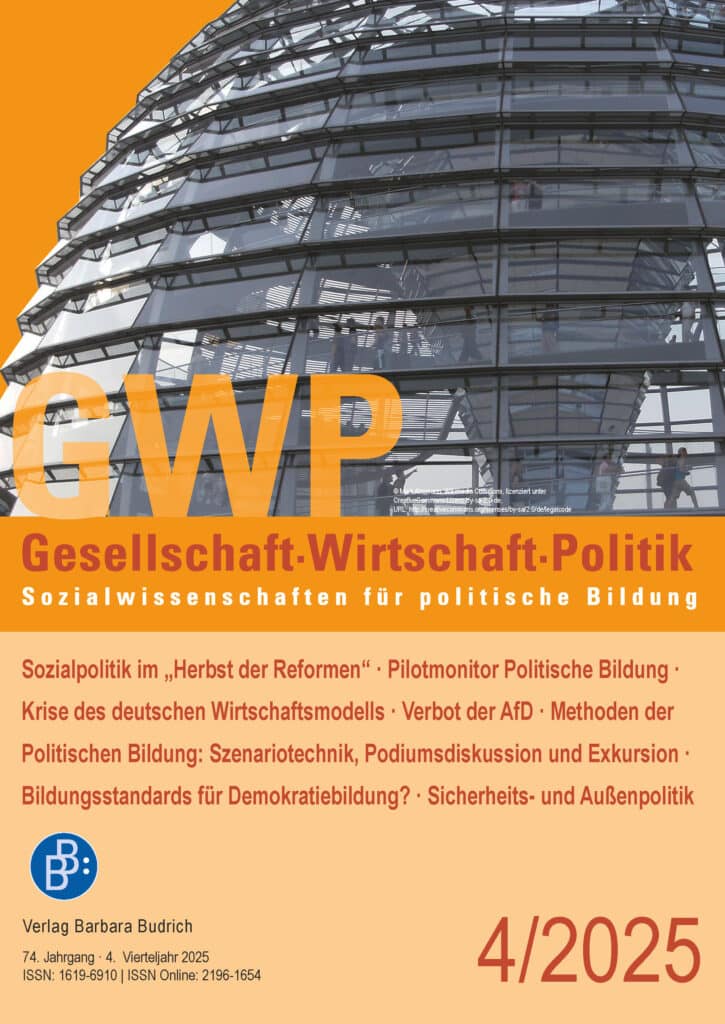Informationen zur Zeitschrift
Startseite » Programm » IJAR 1-2023 | Special issue on industrial democracy
IJAR 1-2023 | Special issue on industrial democracy
Erscheinungsdatum : 31.05.2023
0,00 € - 29,00 €
Inhalt
IJAR – International Journal of Action Research
1-2023: Special issue on industrial democracy
Editorial
Johan E. Ravn / Oier Imaz Alias / Trond Sanne Haga / Davydd J. Greenwood: Special issue of the International Journal of Action Research on industrial democracy
Contributions
Johan E. Ravn / Oier Imaz Alias / Igor Ortega / Trond Sanne Haga / Davydd J. Greenwood: PRODUCTIVE PRAGMATISM: Industrial democracy under neoliberal capitalist conditions
Introduction to invited response essays
Bob Dick: Democratic alternatives to hierarchy – why so few?
Shankar Sankaran: Review of Productive Pragmatism: Can industrial democracy be viable under neoliberalist capital conditions?
Joseph R. Blasi / Douglas Kruse: Comparing organizational democracy in Norway and Mondragon: Lessons learned for other nations and initiatives
Johan E. Ravn / Oier Imaz Alias / Trond Sanne Haga / Davydd J. Greenwood: Varieties of industrial democracy – beyond neoliberalism or not? The Special Issue Editors’ response essay
Interview
Danilo Streck / Miren Larrea: Interview Davydd Greenwood. The Mid-career Making of an Action Researcher
Download of Table of Contents / Inhaltsverzeichnis herunterladen
Download of single articles (Open Access/fee-based): ijar.budrich-journals.com
You can register here for the IJAR alert.
Einzelbeitrag-Download (Open Access/Gebühr): ijar.budrich-journals.com
Sie können sich hier für den IJAR-Alert anmelden.
Zusätzliche Information
| Verlag | |
|---|---|
| ISSN | 1861-1303 |
| eISSN | 1861-9916 |
| Jahrgang | 19. Jahrgang 2023 |
| Ausgabe | 1-2023 |
| Erscheinungsdatum | 31.05.2023 |
| Umfang | 104 Seiten |
| Sprache | Englisch |
| Format | 17 x 24 cm |
| DOI | |
| Open Access-Lizenz | |
| Homepage |
Autor*innen
SchlagwörterAker Solutions, balancing political and socio-technical participation, butterfly effect, employee ownership, Employee Stock Ownership Plan, ESOP, governmentality, Industrial democracy, institutional theory, minimal hierarchy, Mondragon, organizational culture, organizational structure, paradigm shift, productive pragmatism, Soft Systems Methodology, Viable Systems Model, worker cooperative, worker cooperativism
Abstracts
PRODUCTIVE PRAGMATISM: Industrial democracy under neoliberal capitalist conditions (Johan E. Ravn, Oier Imaz Alias, Igor Ortega, Trond Sanne Haga, Davydd J. Greenwood)
This essay presents two case examples of the context and practices of industrial democracy: Norwegian industrial democracy exemplified with the Aker case and the Mondragon Cooperative Experience (a term Mondragon often uses to describe its whole structure and history). The comparison illustrates the necessity of combining general systems theory, the distinction between political and socio-technical participation, and the role of ethos, worldview, and heedfulness in understanding how these enterprises operate and manage ongoing challenges. Our central motive is to promote the expansion of organizational democracy within the global industrial system as a superior and more humane alternative to global neoliberal capitalism. These are not simple comparisons because these systems have different histories, contexts, and dynamics. In making the comparison, we show that the constant process of balancing and rebalancing political and socio-technical participation is key dynamic in keeping such democratic systems viable. We also show that enterprise ethos and worldview, far from being an add-on or a “soft” dimension, is the bedrock on which such systems rely. After making this general presentation, we put these systems in motion to show how they address the challenges of downsizing and strategic planning. Downsizing and strategic planning show both systems’ ability to face unexpected events and effectively cope with their potential consequences. We conclude that the differences between the cases show there is no one right way to create democratic organizations, but that paths exist and remain open for many different versions of these more humane and successful industrial organizations so necessary for creating sustainable societies. Keywords: productive pragmatism, industrial democracy, worker cooperativism, Aker Solutions, Mondragon
» Download Single Contribution Free of Charge (Budrich Journals) / Einzelbeitrag kostenlos herunterladen (Budrich Journals)
Democratic alternatives to hierarchy – why so few? (Bob Dick)
Examples are briefly described of organizations that offer a perspective to complement the experience of industrial democracy inNorway and Mondragon. The examples are organizations choosing a structure and culture that minimize hierarchy. They provide a lesstraditional approach to balancing political and socio-technical participation. To do so they devolve responsibility for coordination of effort and expertise to individuals and teams most directly providing the effort and expertise. This gives the individuals and teams high autonomy. Examples include a university class, action learning projects in community and organizational settings, and a voluntary self-organizing network of facilitators. In addition, a small sample of organizations from the larger sample documented by Corporate Rebels (https://corporate-rebels.com/) is also briefly described and compared. Finally, the examples are located within other, wider, changes taking place. Keywords: balancing political and socio-technical participation, organizational structure, organizational culture, industrial democracy, minimal hierarchy, butterfly effect, paradigm shift
» Download Single Contribution Free of Charge (Budrich Journals) / Einzelbeitrag kostenlos herunterladen (Budrich Journals)
Review of Productive Pragmatism: Can industrial democracy be viable under neoliberalist capital conditions? (Shankar Sankaran)
I review the two cases of industrial democracy in Norway and Mondragon using multiple perspectives. From a system thinking perspective, I use a General Systems Theory (GST), Viable Systems Model and Soft Systems Methodology. From a management perspective, I examine how institutional entrepreneurship plays a role in creating new ways of coping with regulative, normative, and cultural-cognitive forces impacting the two cases. I then view the two economies from a governmentality perspective on how they deal with power and autonomy. My analysis demonstrates that the two democracies have coped well with internal and external forces. I also argue that industrial democracy would face challenges in dealing with new ways of working that have emerged due to the influence of technology. Keywords: Viable Systems Model; Soft Systems Methodology; Institutional Theory; Governmentality
» Download Single Contribution Free of Charge (Budrich Journals) / Einzelbeitrag kostenlos herunterladen (Budrich Journals)
Comparing organizational democracy in Norway and Mondragon: Lessons learned for other nations and initiatives (Joseph R. Blasi and Douglas Kruse)
We have been asked to compare and contrast the Norwegian system of industrial democracy with the Mondragon federated corporation of worker cooperatives to arrive at a realistic appraisal of what can be learned from both systems and to discern the lessons to be learned for other nations and other initiatives. In doing so, the kinds of lessons that are needed for the emerging system of broad-based employee share ownership and industrial participation in the United States will be introduced as a part of our analysis. We are hoping that our colleagues and readers can benefit from the books and empirical research sponsored by Rutgers University’s Institute for the Study of Employee Ownership and Profit Sharing and our sister Journal of Participation and Employee Ownership. Keywords: employee ownership, ESOP, worker cooperative, Employee Stock Ownership Plan
» Download Single Contribution Free of Charge (Budrich Journals) / Einzelbeitrag kostenlos herunterladen (Budrich Journals)
Inhalt
Inhalt
IJAR – International Journal of Action Research
1-2023: Special issue on industrial democracy
Editorial
Johan E. Ravn / Oier Imaz Alias / Trond Sanne Haga / Davydd J. Greenwood: Special issue of the International Journal of Action Research on industrial democracy
Contributions
Johan E. Ravn / Oier Imaz Alias / Igor Ortega / Trond Sanne Haga / Davydd J. Greenwood: PRODUCTIVE PRAGMATISM: Industrial democracy under neoliberal capitalist conditions
Introduction to invited response essays
Bob Dick: Democratic alternatives to hierarchy – why so few?
Shankar Sankaran: Review of Productive Pragmatism: Can industrial democracy be viable under neoliberalist capital conditions?
Joseph R. Blasi / Douglas Kruse: Comparing organizational democracy in Norway and Mondragon: Lessons learned for other nations and initiatives
Johan E. Ravn / Oier Imaz Alias / Trond Sanne Haga / Davydd J. Greenwood: Varieties of industrial democracy – beyond neoliberalism or not? The Special Issue Editors’ response essay
Interview
Danilo Streck / Miren Larrea: Interview Davydd Greenwood. The Mid-career Making of an Action Researcher
Download of Table of Contents / Inhaltsverzeichnis herunterladen
Download of single articles (Open Access/fee-based): ijar.budrich-journals.com
You can register here for the IJAR alert.
Einzelbeitrag-Download (Open Access/Gebühr): ijar.budrich-journals.com
Sie können sich hier für den IJAR-Alert anmelden.
Bibliografie
Zusätzliche Information
| Verlag | |
|---|---|
| ISSN | 1861-1303 |
| eISSN | 1861-9916 |
| Jahrgang | 19. Jahrgang 2023 |
| Ausgabe | 1-2023 |
| Erscheinungsdatum | 31.05.2023 |
| Umfang | 104 Seiten |
| Sprache | Englisch |
| Format | 17 x 24 cm |
| DOI | |
| Open Access-Lizenz | |
| Homepage |
Produktsicherheit
Bewertungen (0)
Bewertungen
Es gibt noch keine Bewertungen.
Autor*innen
Autor*innen
Schlagwörter
SchlagwörterAker Solutions, balancing political and socio-technical participation, butterfly effect, employee ownership, Employee Stock Ownership Plan, ESOP, governmentality, Industrial democracy, institutional theory, minimal hierarchy, Mondragon, organizational culture, organizational structure, paradigm shift, productive pragmatism, Soft Systems Methodology, Viable Systems Model, worker cooperative, worker cooperativism
Abstracts
Abstracts
PRODUCTIVE PRAGMATISM: Industrial democracy under neoliberal capitalist conditions (Johan E. Ravn, Oier Imaz Alias, Igor Ortega, Trond Sanne Haga, Davydd J. Greenwood)
This essay presents two case examples of the context and practices of industrial democracy: Norwegian industrial democracy exemplified with the Aker case and the Mondragon Cooperative Experience (a term Mondragon often uses to describe its whole structure and history). The comparison illustrates the necessity of combining general systems theory, the distinction between political and socio-technical participation, and the role of ethos, worldview, and heedfulness in understanding how these enterprises operate and manage ongoing challenges. Our central motive is to promote the expansion of organizational democracy within the global industrial system as a superior and more humane alternative to global neoliberal capitalism. These are not simple comparisons because these systems have different histories, contexts, and dynamics. In making the comparison, we show that the constant process of balancing and rebalancing political and socio-technical participation is key dynamic in keeping such democratic systems viable. We also show that enterprise ethos and worldview, far from being an add-on or a “soft” dimension, is the bedrock on which such systems rely. After making this general presentation, we put these systems in motion to show how they address the challenges of downsizing and strategic planning. Downsizing and strategic planning show both systems’ ability to face unexpected events and effectively cope with their potential consequences. We conclude that the differences between the cases show there is no one right way to create democratic organizations, but that paths exist and remain open for many different versions of these more humane and successful industrial organizations so necessary for creating sustainable societies. Keywords: productive pragmatism, industrial democracy, worker cooperativism, Aker Solutions, Mondragon
» Download Single Contribution Free of Charge (Budrich Journals) / Einzelbeitrag kostenlos herunterladen (Budrich Journals)
Democratic alternatives to hierarchy – why so few? (Bob Dick)
Examples are briefly described of organizations that offer a perspective to complement the experience of industrial democracy inNorway and Mondragon. The examples are organizations choosing a structure and culture that minimize hierarchy. They provide a lesstraditional approach to balancing political and socio-technical participation. To do so they devolve responsibility for coordination of effort and expertise to individuals and teams most directly providing the effort and expertise. This gives the individuals and teams high autonomy. Examples include a university class, action learning projects in community and organizational settings, and a voluntary self-organizing network of facilitators. In addition, a small sample of organizations from the larger sample documented by Corporate Rebels (https://corporate-rebels.com/) is also briefly described and compared. Finally, the examples are located within other, wider, changes taking place. Keywords: balancing political and socio-technical participation, organizational structure, organizational culture, industrial democracy, minimal hierarchy, butterfly effect, paradigm shift
» Download Single Contribution Free of Charge (Budrich Journals) / Einzelbeitrag kostenlos herunterladen (Budrich Journals)
Review of Productive Pragmatism: Can industrial democracy be viable under neoliberalist capital conditions? (Shankar Sankaran)
I review the two cases of industrial democracy in Norway and Mondragon using multiple perspectives. From a system thinking perspective, I use a General Systems Theory (GST), Viable Systems Model and Soft Systems Methodology. From a management perspective, I examine how institutional entrepreneurship plays a role in creating new ways of coping with regulative, normative, and cultural-cognitive forces impacting the two cases. I then view the two economies from a governmentality perspective on how they deal with power and autonomy. My analysis demonstrates that the two democracies have coped well with internal and external forces. I also argue that industrial democracy would face challenges in dealing with new ways of working that have emerged due to the influence of technology. Keywords: Viable Systems Model; Soft Systems Methodology; Institutional Theory; Governmentality
» Download Single Contribution Free of Charge (Budrich Journals) / Einzelbeitrag kostenlos herunterladen (Budrich Journals)
Comparing organizational democracy in Norway and Mondragon: Lessons learned for other nations and initiatives (Joseph R. Blasi and Douglas Kruse)
We have been asked to compare and contrast the Norwegian system of industrial democracy with the Mondragon federated corporation of worker cooperatives to arrive at a realistic appraisal of what can be learned from both systems and to discern the lessons to be learned for other nations and other initiatives. In doing so, the kinds of lessons that are needed for the emerging system of broad-based employee share ownership and industrial participation in the United States will be introduced as a part of our analysis. We are hoping that our colleagues and readers can benefit from the books and empirical research sponsored by Rutgers University’s Institute for the Study of Employee Ownership and Profit Sharing and our sister Journal of Participation and Employee Ownership. Keywords: employee ownership, ESOP, worker cooperative, Employee Stock Ownership Plan
» Download Single Contribution Free of Charge (Budrich Journals) / Einzelbeitrag kostenlos herunterladen (Budrich Journals)










Bewertungen
Es gibt noch keine Bewertungen.